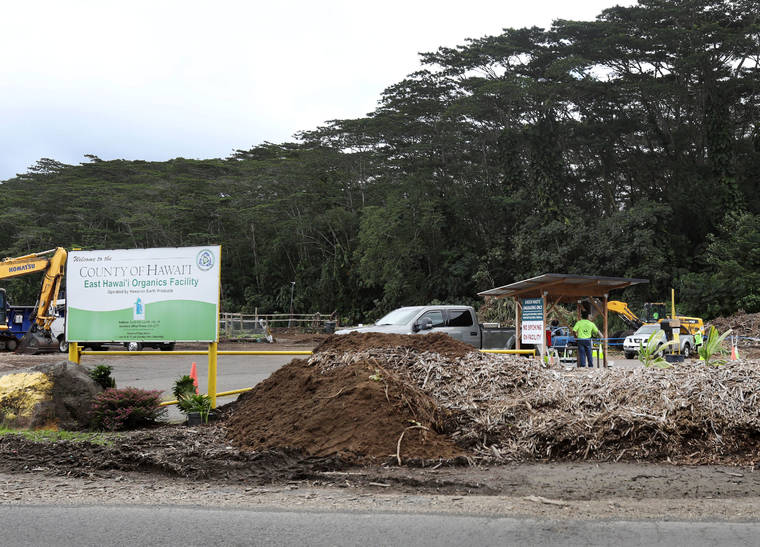This might be one of those cases where bigger isn’t necessarily better, at least when it comes to turning waste into compost.
Several members of the Environmental Management Commission indicated concern Wednesday after hearing from organizations advocating a distributed network of community sites instead of the $10.5 million facility for which the county has contracted.
The county’s contract with Hawaiian Earth Recycling, inked just days before former Mayor Billy Kenoi left office in 2016, is currently on hold after the county and the contractor signed a six-month “act of god” abeyance because of the coronavirus pandemic.
But the potential problems with the new facility, to be located in Keaau, don’t stop with COVID-19. The county is also facing a shortage of critical raw materials, in particular green waste, which is of high demand in East Hawaii, and food waste, for which pig farmers have already spoken.
“For the compost facility; the term we’re using now is ‘suspended.’ There would be a lot of obstacles to moving forward with that,” said recycling coordinator George Hayducsko. “It’s suspended as it was proposed. … It is suspended for now.”
Hayducsko said the county’s “enhanced mulch” is extremely popular in East Hawaii while not as much in West Hawaii, requiring the county to truck it across the island. A recent Saturday at the Hilo landfill brought in 480 customers seeking mulch, he said.
“There is such a demand for our material in Hilo, we just can’t support the demand,” he said. “The farmers love it, the community loves it.”
The mulch operation in Kealakehe, on the other hand, is costing the county almost $500,000 annually, he said.
A bill that’s been floating in the state Legislature would allow “artisan-scale” composting facilities that would be exempt from the stricter rules imposed by the state Department of Health. The measure, Senate Bill 2532, didn’t pass the most recent legislative session, but advocates have hope for the future.
Hayducsko said he’s part of a network of community groups and government officials looking at possibilities for legislation. In the meantime, the county’s latest project is looking at ways to reduce food waste, to tackle the source reduction aspect of waste management.
Representatives of two organizations currently creating compost on a smaller scale explained their processes to commissioners, with both agreeing a centralized large-scale facility won’t serve the community’s needs and will add more costs because of the trucking involved.
“If I haven’t made it clear, I think the giant composting facility is a terrible idea,” said Michael Pierron of Compost Hawaii. “Multiple small-scale facilities are what we should be focusing on right now because of the population density.”
His business picks up buckets of compost from a network of subscriber homes and businesses in the Hilo area and exchanges them for compost credits after the waste is processed.
On the west side of the island, Chantal Chung and Evan Lam of Maona Community Garden in Captain Cook described their setup that tests a variety of composting methods to create a proof of concept for the best methods.
“What I’m advocating for, is the county’s partnership and help because we all carry pieces of this,” Lam said. “Everybody here holds a different piece of that puzzle.”
Ultimately, though, Commissioner Jon Olson noted, it boils down to money.
“The first thing we have to focus on, is look at where the money’s coming from,” Olson said.
Email Nancy Cook Lauer at ncook-lauer@westhawaiitoday.com.






